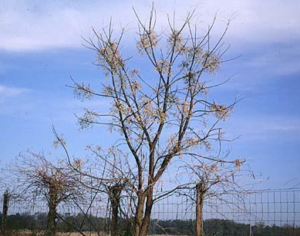Chinaberry: Pretty to Look at but Keep Your Distance
go.ncsu.edu/readext?643013
en Español / em Português
El inglés es el idioma de control de esta página. En la medida en que haya algún conflicto entre la traducción al inglés y la traducción, el inglés prevalece.
Al hacer clic en el enlace de traducción se activa un servicio de traducción gratuito para convertir la página al español. Al igual que con cualquier traducción por Internet, la conversión no es sensible al contexto y puede que no traduzca el texto en su significado original. NC State Extension no garantiza la exactitud del texto traducido. Por favor, tenga en cuenta que algunas aplicaciones y/o servicios pueden no funcionar como se espera cuando se traducen.
Português
Inglês é o idioma de controle desta página. Na medida que haja algum conflito entre o texto original em Inglês e a tradução, o Inglês prevalece.
Ao clicar no link de tradução, um serviço gratuito de tradução será ativado para converter a página para o Português. Como em qualquer tradução pela internet, a conversão não é sensivel ao contexto e pode não ocorrer a tradução para o significado orginal. O serviço de Extensão da Carolina do Norte (NC State Extension) não garante a exatidão do texto traduzido. Por favor, observe que algumas funções ou serviços podem não funcionar como esperado após a tradução.
English
English is the controlling language of this page. To the extent there is any conflict between the English text and the translation, English controls.
Clicking on the translation link activates a free translation service to convert the page to Spanish. As with any Internet translation, the conversion is not context-sensitive and may not translate the text to its original meaning. NC State Extension does not guarantee the accuracy of the translated text. Please note that some applications and/or services may not function as expected when translated.
Collapse ▲At this time of the year, when the leaves and temperatures have fallen we yearn to bring nature’s beauty indoors with our holiday decorations. Evergreens like holly, magnolia, junipers and the like. Especially those with berries! One plant that we see with interesting golden berries at this time of year is the Chinaberry.
Chinaberry is a deciduous tree with dark chocolate brown bark that may reach 50 feet in height and 2 feet in diameter. While in flower it’s pretty pinkish-lavender-white blooms perfume the air in early spring. The lacy leaves become golden yellow in fall. It’s common on roadsides and forest edges, and spreads by root sprouts as well as by birds and windblown seeds. This tree is adaptable to many environmental conditions and is virtually disease and insect free, so it’s particularly prolific. Golden berrylike drupes begin to show up in July and will hang onto the trees throughout the winter.
yellow in fall. It’s common on roadsides and forest edges, and spreads by root sprouts as well as by birds and windblown seeds. This tree is adaptable to many environmental conditions and is virtually disease and insect free, so it’s particularly prolific. Golden berrylike drupes begin to show up in July and will hang onto the trees throughout the winter.
But beware: All parts of the plant are poisonous to humans, some livestock, and mammals, including cats and dogs if consumed. The plant contains tetranortriterpene neurotoxins that if eaten in large amounts can cause muscle contractions, tremors, collapse, and death. In lesser amounts, symptoms including stomach irritation, vomiting, diarrhea, bloody diarrhea, irregular breathing, respiratory distress are more likely. Some birds and livestock are not affected. Although it doesn’t cause contact dermatitis, these are not the bits of nature that you’ll want to bring indoors.
This tree is recognized as an invasive plant in NC and is not recommended for planting in landscapes. If you have it growing on your property and decide to remove it, cut down large trees with a chainsaw and treat the outer two inches of the cut surface of the stump with undiluted glyphosate concentrate (53.8% is preferable). Large saplings can be treated similarly, taking care to treat the entire cut surface. If berry clusters are present on the cut limbs, collect, bag and dispose of them in heavy garbage bags so they do not sprout. Keep an eye out for seedlings and control them as needed. For more information on some poisonous plants to be aware of in NC take a look at the NC Poison Control website. If you or someone else has been poisoned, please contact Poison Control at 1-800-222-1222.
Minda Daughtry is Horticulture Agent for North Carolina Cooperative Extension in Lee County.




